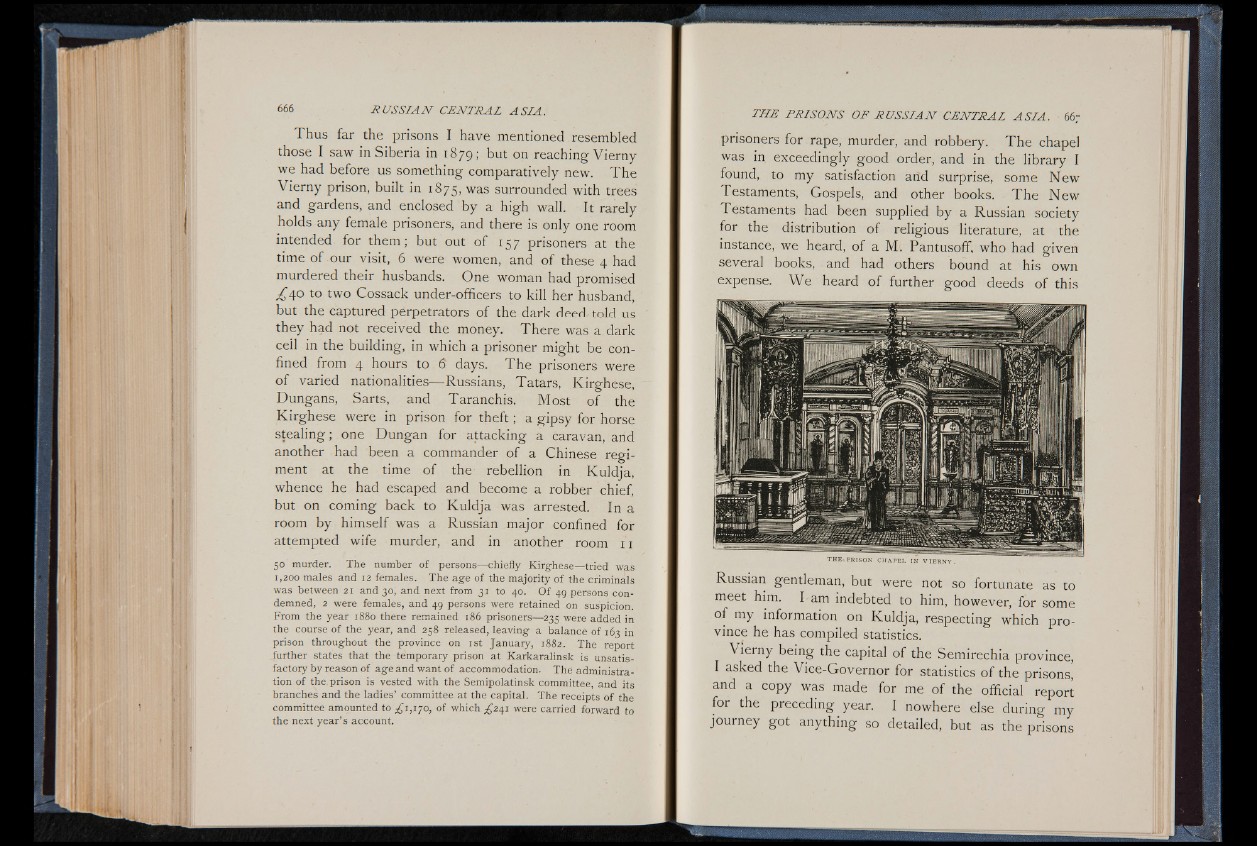
Thus far the prisons I have mentioned resembled
those I saw in Siberia in 1879; but on reaching Vierny
we had before us something comparatively new. The
Vierny prison, built in 1875, was surrounded with trees
and gardens, and enclosed by a high wall. It rarely
holds any female prisoners, and there is only one room
intended for them; but out of 157 prisoners at the
time of our visit, 6 were women, and of these 4 had
murdered their husbands. One woman had promised
,£40 to two Cossack under-officers to kill her husband,
but the captured perpetrators of the dark deed told us
they had not received the money. There was a dark
ceil in the building, in which a prisoner might be confined
from 4 hours to 6 days. The prisoners were
of varied nationalities— Russians, Tatars, Kirghese,
Dungans, Sarts, and Taranchis. Most of the
Kirghese were in prison for the ft; a gipsy for horse
stealing; one Dungan for attacking a caravan, and
another had been a commander of a Chinese regiment
at the time of the rebellion in Kuldja,
whence he had escaped and become a robber chief,
but on coming back to Kuldja was arrested. In a
room by himself was a Russian major confined for
attempted wife murder, and in another room 11
50 murder. The number of persons— chiefly Kirghese— tried was
1,200 males and 12 females. The age of the majority of the criminals
was between 21 and 30, and next from 31 to 40. Of 49 persons condemned,
2 were females, and 49 persons were retained on suspicion.
From the year 1880 there remained 186 prisoners— 235 were added in
the course of the year, and 258 released, leaving a balance of 163 in
prison throughout the province on 1st January, 1882. The report
further states that the temporary prison at Karkaralinsk is unsatisfactory
by reason o f a g e and want of accommodation. The administration
of the prison is vested with the Semipolatinsk committee, and its
branches and the ladies’ committee at the capital. The receipts of the
committee amounted to .£1,170, of which £241 were carried forward to
the next year’ s account.
prisoners for rape, murder, and robbery. The chapel
was in exceedingly good order, and in the library I
found, to my satisfaction arid surprise, some New
Testaments, Gospels, and other books. The New
Testaments had been supplied by a Russian society
for the distribution of religious literature, at the
instance, we heard, of a M. Pantusoff, who had given
several books, and had others bound at his own
expense. We heard of further good deeds of this
THE*PRISON CHAPEL IN VIERNY.
Russian gentleman, but were not so fortunate as to
meet him. I am indebted to him, however, for some
of my information on Kuldja, respecting which province
he has compiled statistics.
Vierny being the capital of the Semirechia province,
I asked the Vice-Governor for statistics of the prisons,
and a copy was made for me of the official report
for the preceding year. I nowhere else during my
journey got anything so detailed, but as the prisons